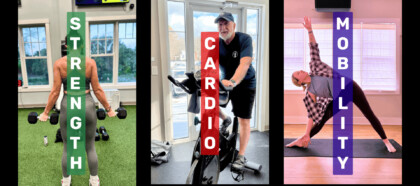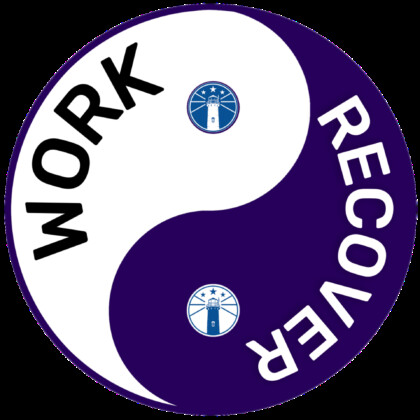How Should You Approach Fitness & Exercise?
Foundational Principles
Rules #1 through #9999 are that the most important thing is that you actually get regular exercise. But what kind(s) of exercise you do does matter.
There isn't necessarily a "right" or "wrong" way to approach it. But we believe there are three basic principles you should bear in mind on your personal fitness journey - both at the outset and along the way. Those are:
① Variety, ② Practicality / Patience, and ③ Balance.

① VARIETY
Cardio, strength training, and mobility work each offer different and important benefits. All three should be a part of your fitness program.
Incorporating variety in your approach to fitness should be a priority for everyone, from elite athletes to average Joes. Think of them as the three legs of a stool.
(And - YES - unless you won the genetic lottery, you really do need more than just golf and walking!)
The inter-relationships between cardio, strength, and mobility are complicated. They're highly interdependent. (Example: Poor cardiovascular conditioning and lack of mobility can make it hard to perform strength training exercises, and poor mobility and strength will impede your ability to do cardio.) And sometimes they can even work against each other. (Example: Narrowly focused approaches to strength training can potentially lead to muscle shortening and mobility issues. Aggressive approaches to cardio can lead to loss of muscle mass.)
🚴🏽 🦴 FYI ...
Bone strengthens over time when subject to load, and gradually weakens in the absence of it. (Astronauts are perhaps the most extreme example.) Believe it or not, cycling isn't technically a load-bearing form of exercise. Factor in the crazy number of hours pro cyclists spend on the bike, plus the intense physiological demands of the sport, and the net result is that elite cyclists often have surprisingly low bone density. Therefore, off-season training protocols for elite cyclists now place a greater emphasis on load-bearing strength training to help riders protect and increase their bone mass.
Furthermore, different approaches and protocols within each of these three pillars offer different results and benefits. Different strength training protocols elicit different adaptations. Likewise, different cardio training methods can provide differing results and benefits.
It can all seem complex, but the answer is simple: mix it up!
We highly recommend that you include all three of these foundational elements - cardio, strength, and mobility work - in your fitness regimen. We also recommend that you incorporate variety within your strength training and cardio workouts - particularly if you’re goal oriented.
② PRACTICALITY/PATIENCE
Odds are that you're not a pro athlete, and don't get paid to exercise. So even if working out is a huge priority in your life, you need to fit it in between work, family, and other demands. Have a plan that maximizes what you get out of your available "me time" at the gym - especially if you're focused on achieving a specific goal.
Don't let great become the enemy of good. Not every "great workout" or "research backed" exercise protocol is going to be right for everyone. Just because there may be "proven benefits" to following a given protocol doesn't mean that it's actually right for you.
★ EXAMPLE: Many elite cardio athletes (including cyclists and even rowers) spend 60 to 80% of their many training hours doing low intensity, steady-state cardio to increase their aerobic capacity. But most people don't have the time or desire to dedicate 10 to 20+ hours every week to monotonous Zone 2 workouts.
On the other end of the spectrum, there are significant and distinct performance and health benefits to working at near maximum cardio intensities (aka Zones 4 & 5, or the Yellow & Red zones in Myzone). But these workouts aren't for everyone either, because they require a willingness to endure major discomfort, and can exact a significant physical and mental toll.
💡 Two more key concepts ... 💡
- Minimum Effective Dose: Derived from the pharmaceutical industry, MED simply means the smallest dose that will produce the desired outcome. The idea is simple: don't overwater your garden. There's no point in doing more than you need to do to accomplish your goals. And it can even be detrimental. (This is one of the key takeaways from Tim Ferriss's multi-million-copies-sold book “The 4 Hour Body” ← first 75 pages free in PDF!)
- Diminishing Returns: A better known but equally important corollary, this simply means that - once you've hit the MED - you'll get less and less out of each incremental unit of effort you put in. If you regularly push yourself well past the point of diminishing returns (aka "habitual overtraining"), you risk sabotaging your progress, or even damaging your health. (More on that below.)

Patience, Young Grasshopper!
It can be possible to make significant improvements in certain key fitness markers in a relatively short period of time - and especially if you’re just starting out. But in the long run - as with most things in life - you have to put in the work on a regular basis, and accept that progress will come incrementally.
For many of us, at least 50% of the battle is just showing up. So focus on exercise that you actually enjoy. But if your goal is to get significant results, you also need to be willing to (prudently) push yourself outside of your comfort zone to make the progress you seek.
Results are what matter most. Be purposeful in your approach, and do what works for you within the confines of your lifestyle, goals, preferences, and capabilities. Slow and steady wins the race. Have a plan that aligns with your goals, preferences, the constraints of your life, and your current abilities. And be willing to tweak that plan as circumstances change.
(Our Personal Trainers are a fantastic resource if you want more detailed and personalized coaching and guidance.)

③ BALANCE
The harder you work, the more emphasis you need to place on recovery and nutrition.
It’s almost inevitable that frequent “hero workouts” will catch up to you, if you aren’t careful to maintain a balance between work and recovery.
Vigorous and prolonged exercise can lead the body to produce endorphins and endogenous endocannabinoids, which can have powerful psychological effects. So-called "runner's high" is the best known example. As with any potent drug, the high can become addictive, and withdrawal from it can lead to significant mood swings. Exercise addiction is a real thing, and can have equally real consequences.
Chronic overtraining can bring about a host of negative effects, including fatigue, decreased strength and endurance, hormone imbalances, impaired reproductive health, compromised immunity, adverse effects on metabolism and muscle growth, mental health problems, poor sleep quality, and - in extreme cases - even kidney failure.
So the harder you push yourself, the more you have to prioritize strategies like planned rest days, recovery workouts, mobility work, periodization, emphasizing sleep, and getting proper nutrition and hydration.
If you're regularly training hard but not placing an equal (or - better yet - greater!) emphasis on rest, nutrition, and recovery, it will catch up to you.
WHAT'S NEXT?
Gravitate towards what you're most interested in, and don't overthink it. But know that your progress will likely be limited by your willingness to get outside of your comfort zone. Keep putting one foot in front of the other, and see where it leads you. (You just might be pleasantly surprised!)
Chatham Works offers a variety of choices to appeal to a wide range of preferences, enable you to work on strength + cardio + mobility, and help keep you from getting bored.
★ If you prefer to just work out on your own, check out our Basic Gym memberships and Gym Pass options. (FYI, Basic Gym members also get a discount on Class Passes.)
★ If you prefer to be in a group and be led by an instructor, take a look at our THE WORKS memberships and Class Pass options. We proudly offer the Lower Cape's widest selection of Group Exercise classes, all taught by experienced and dedicated professionals.
★ Or, if you're not sure where to start - or want expert coaching and instruction - we'd be happy to set up a time to meet with one of our amazing Personal Trainers to come up with a plan that works for you.
Lastly, if you're feeling a bit intimidated about the idea of coming into the gym, know that you are NOT alone! (Click here for some additional perspective ...)